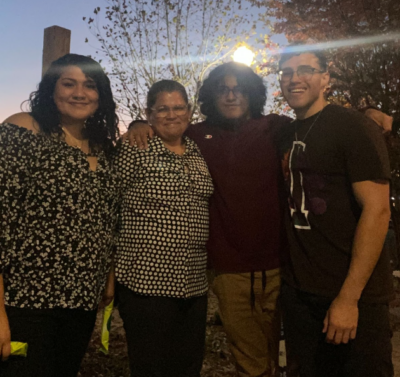Written by Gladis Garcia
Photo: From left to right: me, my mom, my younger brother Diego, and my older brother Carlos
Both of my parents grew up poverty-stricken. My father grew up in a small village called Boquin, with extremely hot weather and nothing but dry land. He was raised by his grandparents, who only allowed him to go to school until the second grade, and he was forced to stop because his family needed him to work to make money after the first earthquake he experienced. As a 10-year-old, he would wake up early in the morning to sell pillows, mops, brooms, and super glue. Growing up in El Salvador, he continued to sell different things to bring home some money to his family.
My mother also grew up in a small village bordering Honduras called Santa Clarita, raised by her paternal grandmother and her great grandfather. She would often cross the Honduran border to buy fruits, milk, and tortillas to sell in her village. As she entered high school, her grandmother sent her to live in San Salvador so she could attend school there and help her aunt with her dairy-selling business.
My parents met in San Salvador while working in the same clothing store and married shortly after. After having my older brother, my father first made the journey to the U.S.. Once, he worked in an Italian restaurant in New York for a couple of months to establish a home, and my mom followed, leaving my brother in El Salvador with my grandmother. While my parents were excited to start new lives, it was still a difficult experience.
They both had terrible experiences being smuggled from Chiapas, Mexico, to Guadalajara. My father was at the bottom of the bus under the seats, while my mother was smuggled under a trailer truck. The trip was 18 hours long, and they described it as sweltering in a confined area, unable to stretch, drink water, eat food, or use the restroom. Both of my parents crossed the border through the Sonoran Desert in Arizona, the infamous desert that is known for contributing to a high number of migrant deaths.
My older brother arrived two months after my mom. In the U.S., our family began to grow. I am the first-born American citizen in my immediate family. As a daughter of immigrant parents, I’ve been very involved with the process of my family’s attempt to obtain their residency.
I remember it being a lengthy process, but it was all worth it when my mom and brother received their residency cards in the mail. My mother let out a shriek and tears of joy. We couldn’t believe their distress, hard work, and drive for a new life had finally paid off. It caused a huge amount of relief for all of us. My family didn’t have to live in constant fear that they would be deported, and I didn’t have to live with the anxiety that I would be separated from them anymore.
Growing up, I attended a handful of immigration reform rallies with my mom in D.C. while I didn’t know it then, going to those protests changed me. As I stood there surrounded by people rallying for a good cause in a country where a small but loud minority sees immigrants as unwanted, I felt beyond proud of every single one of them and those who support them.
I am who I am because of my family and the sacrifices they continue to make for my siblings and me. I am eternally grateful to be the daughter of an immigrant family.


